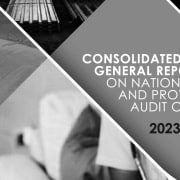|
Getting your Trinity Audio player ready...
|
National Treasury (NT) has finally tabled its 2021/22 annual report in Parliament, after finance minister Enoch Godongwana had asked the parliamentary speaker Nosiviwe Mapisa-Nqakula to extend the deadline of 15 January.
NT’s 2021/22 annual report was delayed because of an ongoing dispute between NT and the Auditor-General of South Africa (Agsa), which gave the report a qualified opinion. Agsa said the entity failed to disclose R68-million in fruitless and wasteful expenditure in relation to payments for the Integrated Financial Management System – a tool which Treasury does not use, but for which it pays R68-million a year.
A qualified opinion, says Agsa, happens when “the financial statements contain material misstatements in specific amounts, or there is insufficient evidence for us to conclude that specific amounts included in the financial statements are not materially misstated.”
Section 40(3)(b)(i) of the Public Finance Management Act (PFMA) requires NT to disclose particulars of all fruitless and wasteful expenditure that had occurred during the financial year in its annual financial statements.
“The department did not record fruitless and wasteful expenditure in note 26 to the financial statements of R68-million (2021: R67-million), in respect of payments for the technical support and maintenance on licences for the Integrated Financial Management System (IFMS) for which no value was derived.
“The balances of fruitless and wasteful expenditure were incorrectly removed in note 26.1 and disclosed as a prior period error in note 26.2 and note 36. Consequently the fruitless and wasteful expenditure balance as at 31 March 2022 is understated by R400-million (2021: R333-million) and the prior period error note is misstated,” said auditor-general Tsakani Maluleke in the report.
“I believe that the audit evidence I have obtained is sufficient and appropriate to provide a basis for my qualified opinion.”
Scopa displeased with delay
In November 2022 the Standing Committee on Public Accounts (Scopa) expressed its displeasure with the delay, which happened because of disputes with Agsa regarding the IFMS, according to acting Treasury director-general Ismail Momoniat.
Committee members were unmoved. Sakhumzi Somyo said the failure to table the report should elicit as sharp rebuke, as National Treasury should be exemplary in matters of financial accountability. Fellow member Alfred Lees said the committee needs to know the details of why the tabling of the report has been delayed and what the disputes are.
Scopa chairperson Mkhuleko Hlengwa said that the delay on the basis of a dispute with Agsa does not mean National Treasury has not complied. “The prescripts of the law allow you to engage in the process you are in now,” he said.
As the custodians of the PFMA, however, NT needs to set the standard, Hlengwa added. “Therefore it does draw our attention when you don’t table. You do need to delve into the merits of why you have not tabled, so that there is clarity and understanding; and to avoid the precedence. Because non-tabling really, whilst provided for, in our view is not a norm. It should arise in extraordinary circumstances.”
Gondongwana agreed that the treasury cannot afford to lower the bar. “It is my intention that it should not do so.”








